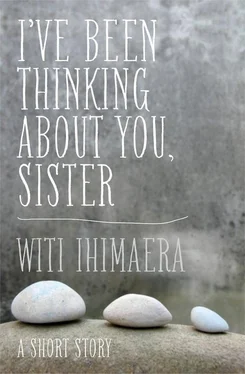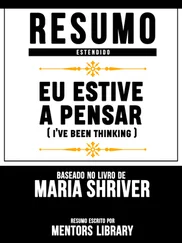‘It really is impossible,’ Monsieur Samaritan said.
Mum was standing with the sun shining full upon her face. Perspiration beaded her forehead and neck. Dad saw her face crumple and went to offer her solace. ‘Keep your hands off me,’ she screamed, frustrated.
Then she saw a little brown bird. It fluttered above her, cocked an eye and turned away. With a cry, Mum took off after it, following the bird as it dipped and sashayed around the white crosses, up, over and down a small hillock. When Dad and Monsieur Samaritan reached the top of the hillock, they saw Mum in the distance, kneeling beside a small cross, weeping. By the time they caught up with her again, she was putting her river stones on Uncle Rangiora’s grave. She had already poured her river water out of its bottle and it was seeping into the sand. There was a radiant look on her face, as if something important had been completed.
Dad and Monsieur Samaritan waited in silence. Then, ‘I will go back to the car and wait for you,’ Monsieur Samaritan said. ‘Please take as much time as you wish, but we should be returning to the airport shortly.’
Dad nodded at him. He watched Mum as she finished laying her river stones. She stood up, wiped her hands on her dress, smiled at Dad and put out her hands. ‘I’m sorry I yelled at you. Will you dance a waltz with me, Dad?’
Gripping his walking stick in one hand and Mum in the other, Dad did his best.
When I grow too old to dream,
I’ll have you to remember,
When I grow too old to dream,
Your love will stay in my heart —
Mum and Dad returned to the airport. Monsieur Samaritan escorted them through customs and saw them to their flight. ‘I’m so sorry you didn’t have more time with your brother,’ he said to Mum.
‘Sorry?’ Mum answered. ‘Please don’t be. And thank you, Monsieur Samaritan.’
From Paris, my parents went on to New York. There’s a photograph taken by a sidewalk photographer which captures the glow of Mum’s happiness. She’s with Dad, and he’s balancing on his walking stick and wearing his white trainers. My cousin Watene took them to see 42nd Street and Cats . Mum told Dad she didn’t want to sleep for one minute, and dragged him up the Empire State Building and down to the ferry to see the Statue of Liberty.
Four days later, they boarded a bus for a tour across America all the way to the West Coast. Dad was looking forward to the trip and his eyes brightened when he saw all the other tourists boarding the bus. As I have mentioned before, he loves to talk to strangers about his family, his tribe, and his sporting exploits.
However, his face fell when he discovered that the other tourists on the bus were German-speaking and didn’t understand English very well.
My parents survived the bus tour. They caught the plane from Los Angeles back to New Zealand, where they were welcomed with tears and much elation by a huge whanau that has never wanted them to go away overseas again — ever.
On their return home, Mum bought four huge scrapbooks and pasted every postcard, photograph and programme into it, including the souvenir programme from the Folies Bergère and the photograph taken in New York. Pride of place was reserved for a blow-up of a photograph of her and Dad standing at Uncle Rangiora’s grave in the hot sun in Tunisia; with them is a gentleman dressed formally and wearing the shiniest shoes — Monsieur Samaritan. Dad had his hip operation, and put away his walking stick and his new white trainers.
If you go home to Te Hapara, you will see the map of Mum and Dad’s travels on the wall in the living room.
* * *
Three months after the trip, Mum telephoned me in Wellington. She told me she was bothered about Rangiora being buried so far away from New Zealand. ‘I want him to come back home,’ she told me.
On her behalf I wrote to the Minister of Defence and the Minister of Maori Affairs. They both gave the same response: the Maori Battalion had made a collective agreement that all the boys who died on the battlefield should stay together in the country where they had fallen.
Dad is ninety-two this year. Mum is eighty-five. She still puts a memorial notice about Uncle Rangiora in The Gisborne Herald every year.
Described by Metro magazine as ‘Part oracle, part memoralist, Ihimaera is an inspired voice, weaving many stories together’, Witi Ihimaera was the first Maori novelist and has published many notable novels and collections of short stories, he has written for stage and screen, edited books on the arts and culture, as well as published various works for children. His best-known novel is The Whale Rider , which was made into a hugely, internationally successful film in 2002. Apart from his work as a writer, Ihimaera has also had careers in teaching, theatre, opera, film and television. He has received numerous awards, including the Wattie Book of the Year Award and the Montana Book Award, his most recent being the inaugural Star of Oceania Award, University of Hawaii 2009, a laureate award from the New Zealand Arts Foundation 2009, the Toi Maori Maui Tiketike Award 2011, and the Premio Ostana International Award, presented to him in Italy 2010.












